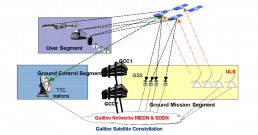The European Union has decided to establish its own global navigation system Galileo. The system will comprise various ground stations and a set of 30 navigation satellites.
The constellation comprises up to 30 satellites in three planes. One of the satellites in each plane serves as a spare.
The constellation is optimized allowing a global position determination and navigation. In addition, the satellites support a global Search and Rescue service (COSPAS-SARSAT).
Our involvement
Antwerp Space was the main contractor in charge of the delivery of the communication networks supporting the operation of the Galileo system: the Mission Data Dissemination Network (MDDN) and the Satellite Data Dissemination Network (SDDN), delivered to their segment prime contractors, respectively Thales Alenia Space France (MDDN) and Astrium UK (SDDN).
These critical networks ensure a highly reliable and real-time connectivity between all remote ground stations and the two redundant Galileo Control Centers located in Germany and Italy. Antwerp Space has been in charge of the design, development, integration and deployment of the networks. The main achievement under the FOC activity was the expansion of the number of Galileo network sites totaling to date more than 30 locations around the world, spread from Kiruna to Kerguelen, including OHB in Bremen. Since the network supports satellite operations, very tight time constraints are imposed on network upgrades. The network activity included the production of 170 racks, made up of more than 5000 COTS equipment, set-up by ~15.000 configuration files. The representative network integration and maintenance platform in Antwerp Space includes 40 interconnected racks. These FOC network activities have been delivered within the originally agreed schedule.
